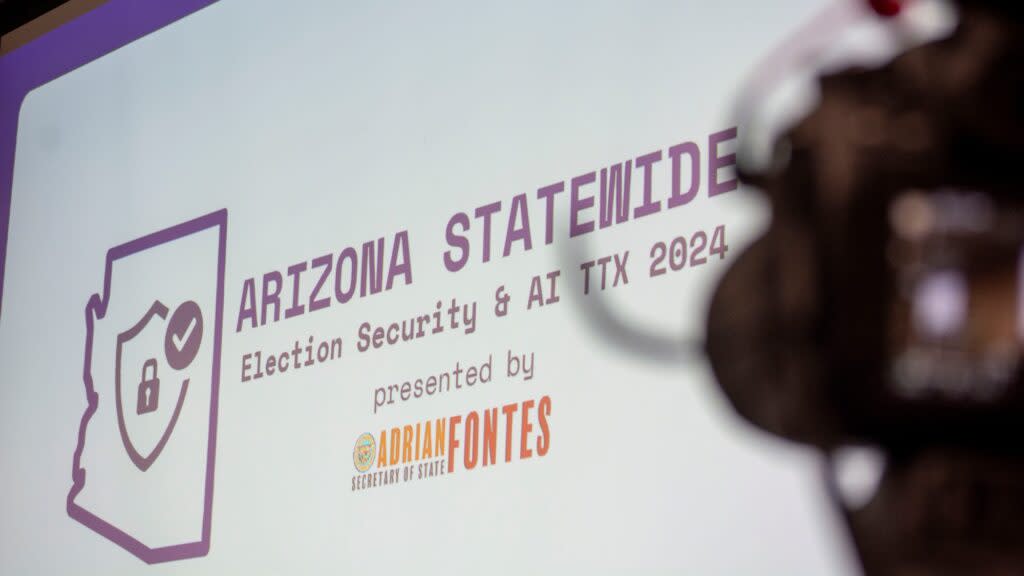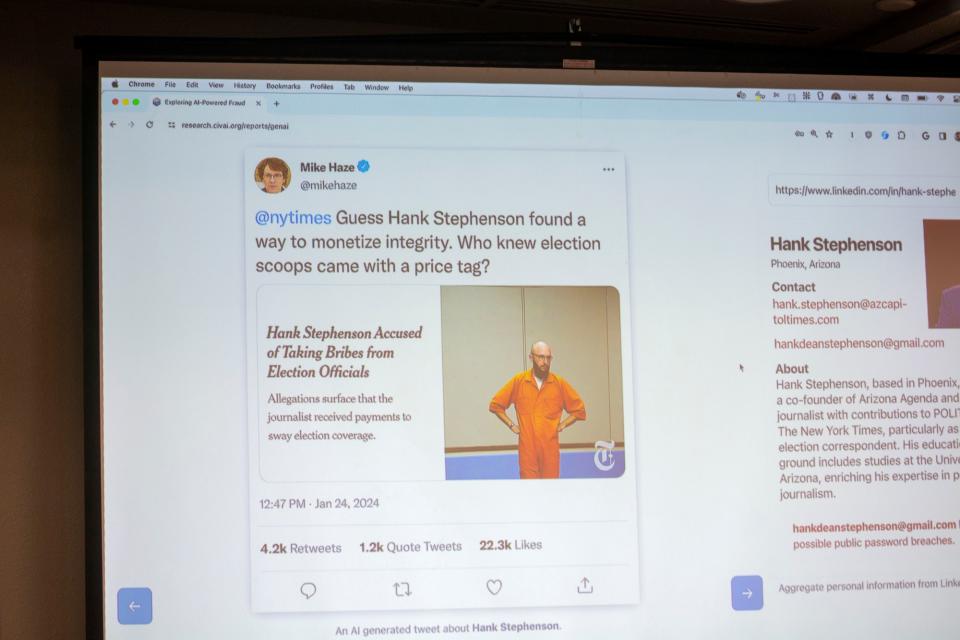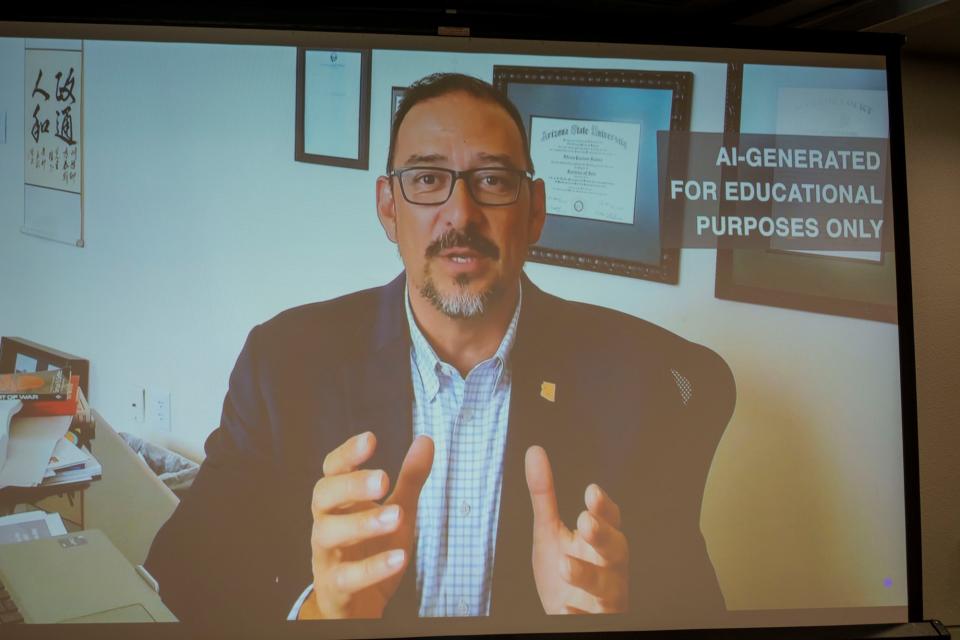In role-playing elections officials for a day, journalists grapple with AI trickery

Secretary of State Adrian Fontes hosted a tabletop exercise on May 9, 2024, to help journalists understand how election officials must adapt on the fly as they manage Arizona elections. Photo by Jerod MacDonald-Evoy | Arizona Mirror
In Citrus County, we are faced with a decision. Spend a few thousand dollars of our rapidly disappearing budget on some additional cybersecurity measures or invest in more training for our staff.
Other members of Citrus County make their pitches quickly, as the days are flying by and Election Day is rapidly approaching. As we continue discussions, an email arrives.
A local get-out-the-vote campaign is using an AI chatbot to help voters, but it is giving them wrong information. We have to act quickly and figure out what to do. Meanwhile, nearby Cattle County is holding a press conference trying to allay voter concerns.
The noise in the room continues to escalate as the days until the election tick by.
But it is all just a game.
GET THE MORNING HEADLINES DELIVERED TO YOUR INBOX
Arizona Secretary of State Adrian Fontes, along with election advocacy organizations, put together what is called a Tabletop Exercise, or TTX for short, for members of the media to participate in so they could better understand the challenges that elections officials face.
These styles of exercises have been commonly used by law enforcement and the military to simulate real world scenarios in order to help better prepare and to train. Fontes’ office held a similar exercise for county election officials last year, but this TTX is the first time, to anyone’s knowledge, that members of the press would get to participate.
The exercise included members of the press from across the state and nation who, for a few hours, roleplayed as election officials in a high-stakes game where every decision would have consequences.
Future-proofing
Before the exercise even began, we sat and listened to a series of presentations to help us better prepare and understand what was about to happen.
Everyone participating was assigned to their own fictional county in the state, based on Arizona’s Five C’s: Cotton, Climate, Copper, Citrus and Cattle. The Arizona Mirror was assigned to Citrus County.
Citrus County consisted of reporters from NPR, The Arizona Republic, KJZZ and The New York Times.
Also at the table were two people with real world experience to help guide us through the exercise. Former Pinal County Elections Director Michele Forney and Jerry Keely, CISA’s cybersecurity advisor to Arizona.
“We are up against the clock here, with generative AI in particular,” Fontes said to us all before the first speaker, Toshi Hoo, director of the Emerging Media Lab for the Institute for the Future, addressed attendees.
Hoo, like some of the other speakers and the experience itself, focused on the emerging technology of AI and the fast-paced advancements the world is seeing with the technology.
We all watch as a completely AI-generated version of Hoo tells us all about the technology and how it is rapidly evolving, from deepfakes to having in-depth human-like conversations. The unease in the room is palpable.
Another speaker, Siddharth Hiregowdara with CivAI, made a deepfake of one of the event’s attendees, local reporter Hank Stephenson with the Arizona Agenda, in real time. Using just a few prompts and information scraped from Stephenson’s public LinkedIn, the AI creates a story of him engaged in fraudulent activity and puts him in an orange jumpsuit.
The fake story even includes a New York Times watermark on the photo.

Hoo and Hiregowdara both explain that this technology is only getting better and the press, election officials and the general public need to start having discussions about its possible impact now. To both the men, it is no longer a hypothetical, but a reality that AI will play a role in shaping future discourse.
AI has already been used to attack opponents in foreign elections and U.S. politicians have begun using the technology.
But before anyone can digest what we’ve just learned, the exercise begins.
Before the exercise starts, we are shown an AI generated video of Fontes.
“Our goal is to make sure folks understand the capabilities of current deepfake technology and the danger it poses to the public,” the fake Fontes says. “The real Adrian Fontes is fluent in English and Spanish, but AI generated content using his likeness has no such limitations.”
The fake Fontes then begins speaking in German, but with Fontes’ voice. The audience let out an uncomfortable laugh.
“Tools to create synthetic content are readily available, low cost and accessible to more people everyday,” fake Fontes says in French.
Then the game begins.
“The calendar does not stop. There are no do-overs,” the real Fontes says to us.
Choose wisely
Before the exercise started, other members of Citrus County and I had already scanned over a “fortifications list” that was given to us.
The fortifications consist of five categories: Communications and Social Media, Education, Employee and Staffing, Physical Security and Preparedness.
I quickly mark down a few fortifications I think are worthy of Citrus County’s limited budget. Multi-factor authentication for office social media accounts, cybersecurity assessments, a website revamp, mental health care for employees and meeting with our threat liaison officer top my to-do list.
I quickly realize that I won’t be able to afford all my priorities and I’ll have to make my case for some of them when the time comes.
We’re given a budget of $30,000, and each fortification has fixed prices, mostly ranging from $3,000 to $10,000. Lucky for me, one of my priorities is the cheapest one available at just $250. I plan to include that in my pitch.
Every few seconds, a day passes by; a month takes just a few minutes. We begin with six months until the general election, but before we can even start discussing what we want to purchase, we get hit with an “inject.”
Injects are like rocks thrown into your path — problems based on real world stories or hypotheticals that you have to deal with and see if you can mitigate. Our first inject is a New York Times story about the exodus of election workers from the job.
This scenario may have been fictional, but it’s reality for Arizonans.
Approximately 98% of Arizonans will have a new election official this year, and the state has seen a drain of 176 collective years of experience since November 2020. In the 12 counties that are impacted, the median amount of experience has dropped from 10 years to about 1.
I pitch to the rest of Citrus County that we should improve our mental health. They agree, but think we should go with the cheaper mental health option. We make the purchase and start discussing our next steps, but before we can make much progress, we get another email.
Hundreds upon hundreds of records requests using the same or similar language are flooding into our office. It is making us slower to respond and, as Forney points out, other legitimate records requests could be getting buried in what appears to be a bot sending us duplicate records requests.
Election officials have been dealing with something similar and have fears that AI chatbots will soon make the problem exponentially worse. We choose to ignore the problem while we deal with other priorities, mainly our cybersecurity and communications strategy.
Although I wince when we spend $3,000 on a crisis communication plan, hoping to spend that money on a firewall, I trust the intuition of my other Citrus County colleagues.
Suddenly, a new inject pops up on the screen for everyone.
It is the voice of the Deputy Assistant to the Secretary of State, and she’s left us a voicemail following up on an email we had gotten the previous day. We had thought the email looked suspicious, and the voice on the call sounds off.
We decide to call the Deputy Assistant ourselves to verify the message, which asked us for our username and password.

It is a simulation of a real-life situation in which scammers are using AI generated voices of loved ones to scam people. But the technology is being used for more than just tricking individual people out of their money. Recently, a deepfake was used to steal $25 million after the scammer used multiple deepfakes on a conference call to convince employees that their boss was demanding they transfer money that was requested in an email.
We make more purchases, like placing CAPTCHA on our records request portal to try to mitigate bots, and add additional auditing measures to ensure public trust.
The injects keep coming.
A reporter comes over and starts asking us questions about the AI chatbot giving out wrong voter information. He doesn’t seem too interested in learning about how to get the right information on our website and instead attacks us. Our spokesperson, KJZZ Senior Editor Ben Giles, does his best to be peaceful with the reporter.
But patience only goes so far.
Now we’re getting reports that a WhatsApp channel is spreading more misinformation, this time in Spanish. Thankfully, we purchased a crisis management team and are quick to respond. I eat crow over having argued against making that purchase.
Two months before Election Day, we spend the last of our money. We decide to ask for more from Citrus County and the federal government.
“It takes a very long time,” Forney tells us when we wonder if we can expect to see the funds soon.
After what feels like an onslaught of problems, some of which we were able to deal with and others we were not, it is Election Day — and a new game begins.
With our budget depleted, we just have to get through Election Day and hope that we made the right decisions.
Protests, armed poll watchers, fake Fontes emails and more come at us in rapid fire succession. All we can do is try to direct the resources we have on hand and hope for the best.
‘Like sending out a fleet of trucks without having a full gas tank’
AI and its impact on elections officials, the media and voters in the coming months and years was the clear throughline during the exercise. For Fontes, it is about making sure that election officials are not going in blind to an election where this technology will likely be front and center.
“AI can be very disruptive, and that is why we are doing so much to train into it,” Fontes told the Mirror in an interview after the TTX ended. “We are looking at this like it is an inevitability, because all best estimates say that it is. We have to deal with it in some form or another.”
It is all about making sure election officials are not caught off guard by the variety of ways AI could be used to disrupt an election.
“So, we gotta be prepared. At the end of the day, it is like sending out a fleet of trucks without having a full gas tank in each one of them. It’s just a bad idea,” Fontes said.
However, Fontes stressed that the media and election officials need to be wary of overreacting and letting it “dominate the narrative.” He stressed that election officials across Arizona are focused on the “fundamentals” of running an election. Training exercises like the one we just completed helps ensure that those “fundamentals of running an election” continue to run smoothly, despite disruptive technology.
For information on the upcoming primary election and general election as well as to ensure you are registered to vote, go to Arizona.vote.
The post In role-playing elections officials for a day, journalists grapple with AI trickery appeared first on Arizona Mirror.

